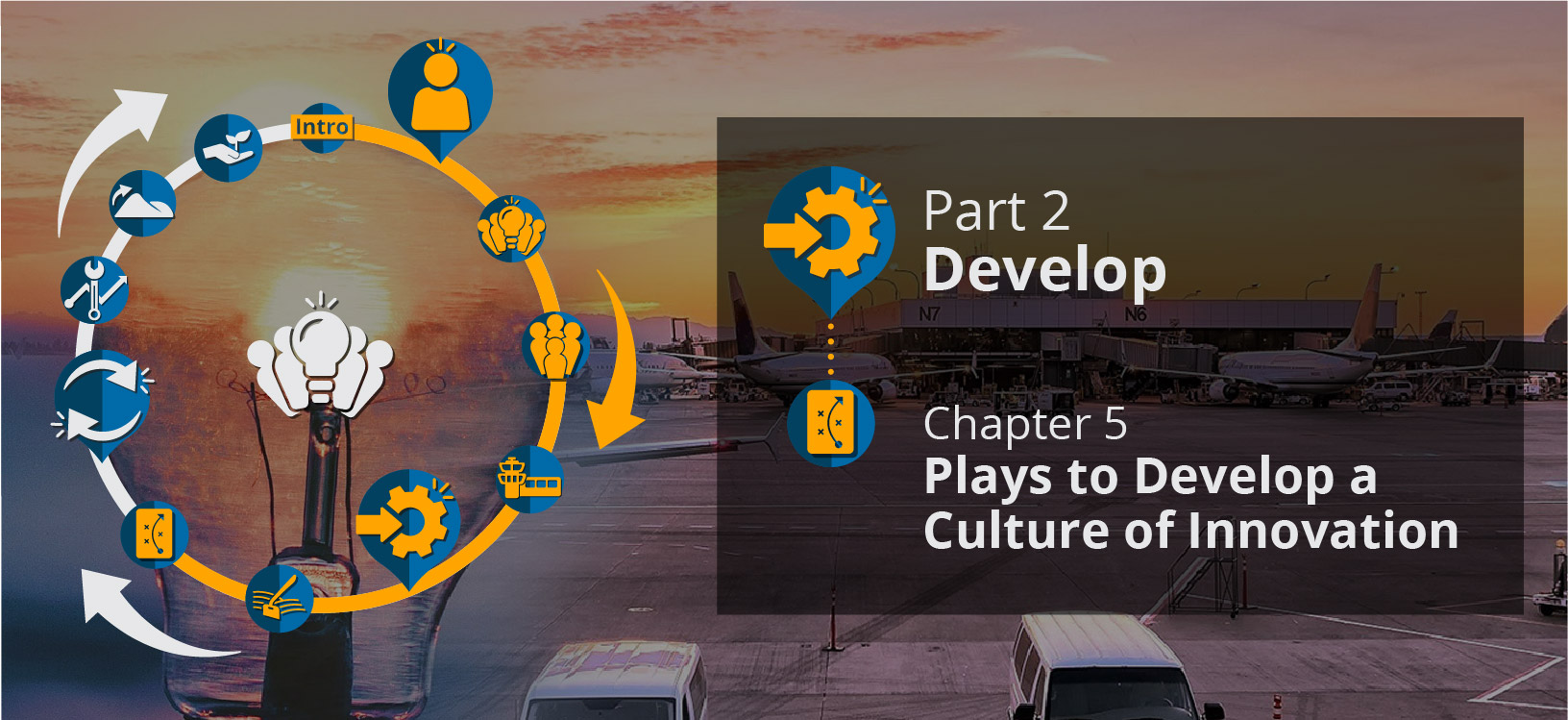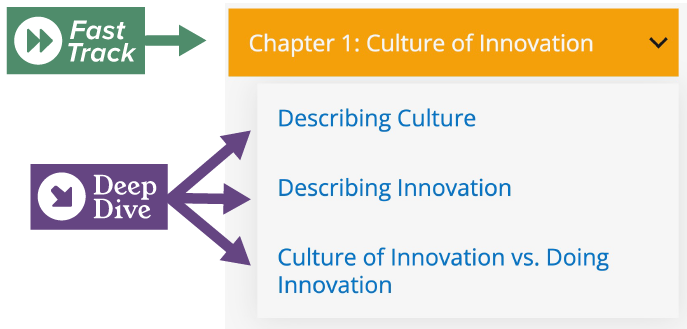

This is a Deep Dive page. Select the chapter for the Fast Track
Play 1: Prioritize Innovation (Leadership)
Formalizing Innovation
Innovative leaders know that creating a culture of innovation takes time, effort, good planning, and teamwork. They can formalize innovation through the following:
- Form a plan. Establish a plan or charter that clarifies what innovation is and why it should be part of the airport's culture. The plan should clearly state goals and objectives related to driving innovation into a culture. (A simple internet search can provide numerous sample innovation plans.) Use the plan to create a strong argument for innovation, including its various benefits to other leaders and governing personnel.
- Create a culture of innovation team. Create a team in one of the various ways as described in detail in Chapter 4. Ensure that team members understand the goals and objectives of the innovation plan and their role on the team. Encourage them to look for more people to cycle in and out of the team as needed.
- Provide innovative training. Ensure that training clarifies and solidifies how an innovative culture impacts each employee. Reiterate that this type of culture does not focus on the next invention, which has an end result, like a new device or product. Rather, an innovative culture most often looks at one task, like an office procedure, to see how it could become more efficient or less costly. These can be small changes that, over time, lead to bigger and bigger effects. Make sure this distinction is clearly specified.
- Measure progress. Define targets and metrics needed to measure success in individual performance reviews. Tie these metrics to employee values and behaviors that support innovation in their daily jobs.
See Innovation Metrics in Chapter 6 for more information on how to develop and understand innovation-related metrics.
Making Innovation a Daily Habit
Innovative leaders schedule innovation for themselves, gather feedback on innovation from others, and encourage respectful challenges. They can make it a daily habit by doing the following:
- Schedule innovation. Devote regular time to deep thinking to solve a problem or work on personal development. Personal development can be reading up on a topic of interest, pushing outside of a comfort zone by taking a course to learn something new, listening to a mentor, or even networking to learn and share with others. Block time on calendars or set alarms on watches or phones to make sure this time is held sacred.
- Gather feedback. Inspire others to innovate by holding regular feedback sessions with employees that encourage upward communication. Hold meetings frequently to collect new ideas from staff that reflect the strategic vision and improve the customer experience. See Seeking Feedback in Chapter 6 for more information on how to collect and acknowledge staff ideas.
- Encourage respectful challenging. Establish a safe space for sharing ideas by first developing group norms where challenging ideas is encouraged, as long as it is done in a respectful and constructive manner. Make innovation a habit by setting reasonable goals and providing tools that lead to their attainment.
Learning How to Inspire Others
Innovative leaders inspire others by exhibiting many of the following traits and practices:
- Passionate. Show enthusiasm for what they do and who they do it for.
- Skillful communicators. Share a vision for the airport in a way that encourages people to join them.
- Strong integrity. Be role models who live out values and principles that support responsibility, purpose, and justice. This helps people see leaders as accountable and trustworthy, and therefore worthy of following.
- Authentic. Be genuine and fair with everyone in all situations. When people work with authentic leaders, they tend to become passionate about what they do, and this cements their loyalty to the organization.
- Open, approachable, and inclusive. Ensure that employees feel valued and appreciated. Encourage people to bring their full selves to the organization and give their all.
- Celebrate the successes of others. Promote a supportive environment, and value collaboration over unhealthy competition. While competition within an organization can be good for sparking innovative ideas, remember that it needs to be balanced with goals of comradery and cooperation. Jeff Hamiel, the former CEO who inspired an innovative culture to grow at Minneapolis-St. Paul International Airport (MSP), believes that innovative leaders should think like entrepreneurs. They should always be looking for new ways to inspire an organization to act in this manner because modeling innovative behavior may inspire others to do the same. He also believes they should be “servant-leaders,” and they should not be afraid to do the hard work. This builds trust and credibility with staff members.
See Equitable Rewards and Recognition in Chapter 6 for more information on how to celebrate with your team.


